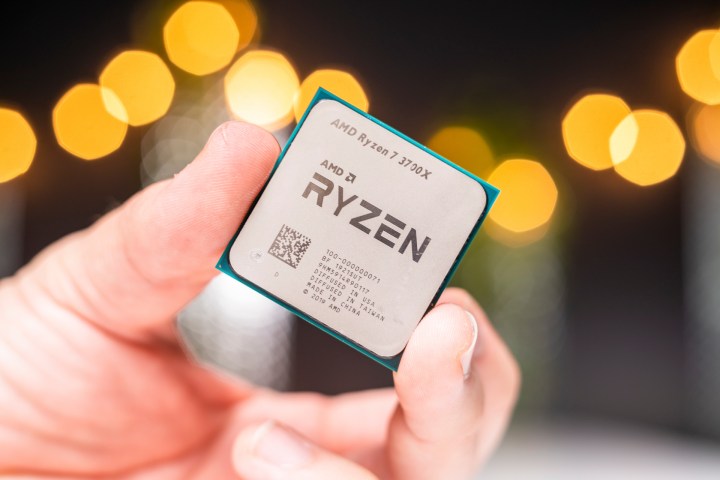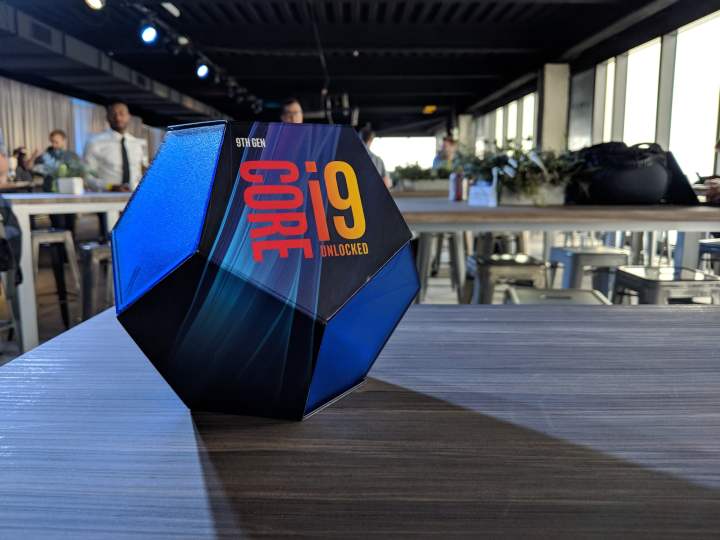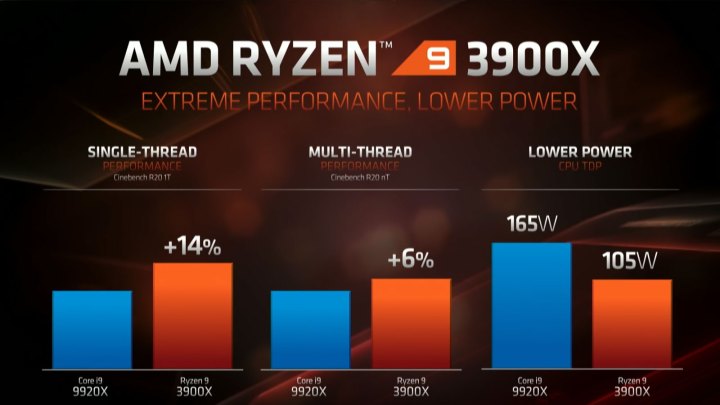The period between late 2018 and early 2019 was an inflection point in the ongoing battle between AMD and Intel. In late 2018, Intel continued its dominance in the gaming space by releasing the i9-9900K, which was the first CPU outside of Intel’s Extreme range to sport the i9 marker. AMD followed up shortly after with the Ryzen 9 3900X. Although AMD had been competitive in productivity apps in its two previous Ryzen generations, the 3900X proved that team red still has the power to go up against Intel.
The 3900X marks a return for AMD, but that doesn’t necessarily mean it’s better than the 9900K. Let’s dig into the details to find the better CPU.
By the numbers

Only eclipsed by its 16-core sibling, the Ryzen 9 3900X is an extremely powerful mainstream CPU packing fantastic specifications. The Core i9-9900K is no slouch, however, and by the numbers, they’re pretty comparable.
| Intel Core i9 9900K | AMD Ryzen 9 3900X | |
| Process node | 14nm | 7nm |
| Cores | 8 | 12 |
| Threads | 16 | 24 |
| L2/L3 cache | 2MB/16MB | 6MB/64MB |
| Base clock speed | 3.6GHz | 3.8GHz |
| Boost clock speed | 4.7GHz (all cores) 5GHz (one core) |
4.1GHz+ (all cores) 4.6GHz (one core) |
| Graphics | Intel UHD Graphics 630 | No |
| TDP | 95w | 105w |
The 3900X has more cores and threads, while Intel’s chip has the stronger clock speed, especially when it comes to single-threaded workloads. Most games now use a handful of cores, so unless you’re overclocking, you won’t typically see 5GHz frequencies when gaming on a 9900K.
The 3900X can boost to 4.6GHz on a single core, but will be closer to 4.1GHz if using all cores and threads at the same time. AMD’s automated overclocking can take it up to 4.3GHz in some cases, though it’s very much dependent on your motherboard, BIOS revision, and cooling.
The 3900X has seen a major increase in instructions per clock over its second-generation predecessors, so it’s more powerful than the 9900K clock for clock. Its huge L2 and L3 cache effectively eliminate the memory latency concerns from the 2nd-generation chips, too.
Gaming

Intel has held a performance edge in gaming for more than a decade, and even with AMD’s fantastic first- and second-generation Ryzen CPUs, that held true. But no longer.
In our gaming tests with Fortnite, Civilization VI, and Assassin’s Creed Odyssey, the 3900X beat out the 9900K — a CPU previously hailed as the best gaming chip ever made — on almost all settings, showing a slight lead. That might not be the crushing numbers that AMD fans hoped for, but this is the first time in more than 10 years that a high-end AMD CPU beat the Intel competition in gaming.
The 3900X showed a decent lead in 3DMark, while in Assassin’s Creed Odyssey, it matched the 9900K on high settings and exceed it on low settings. In Fortnite, the 9900K shot ahead of the 3900X with high settings, but with over 250 fps in all of our tests, that difference hardly matters.
We saw the most drastic difference in Civilization VI. Across high and low settings, the 3900X beat the 9900K. Most grand strategy games stress the CPU more than the GPU, as the processor handles A.I.-driven opponents and multiple interconnected systems. As with Fortnite, both processors delivered above 150 fps across our trials. AMD’s edge in both tests — not in a single test, as was the case with Fortnite — shows its capability as a gaming CPU.
Price is an important factor, though. Although the 9900K was more expensive than the 3900X at launch, it’s cheaper now (a new position for Intel). You can commonly find a 9900K for around $400. The 3900X is closer to its launch price, selling for around $480.
That’s if you can find one in stock. The 3900X is back-ordered at most retailers as of March 2021. The 3900XT may be more readily available depending on where you shop, and it’s almost identical to the 3900X. The XT variant is clocked 100MHz faster out of the box, but that’s the only difference. AMD replaced the 3900X with the 5900X in 2020. The 3900X is still available, though we expect AMD to start phasing it out soon.
The 9900K is almost two generations old, with Intel gearing up to launch the its 11th-gen Rocket Lake processors. Given the massive price cut, we expect Intel has already shipped its remaining stock to retailers. If you want a 9900K new, it’s best to pick one up now.
It is important to consider the ongoing problems Intel faces with CPU performance hindered by Spectre mitigation, too. Those may continue as new bugs are found in the future, whereas AMD’s chips are typically more robust against these kinds of exploits.
Productivity
Heavily multithreaded productivity tasks like video transcoding and editing have been more AMD’s wheelhouse for the past couple of years, with its Ryzen and Threadripper chips competing directly and even pulling ahead of Intel’s more expensive options. With the 3000 series, and specifically the 12-core, 24-thread 3900X, AMD has beaten not only Intel’s mainstream chips (the 9900K included) but will even put some of its older Threadripper cousins out to pasture.
At E3 2019, AMD provided statistics of its 3900X pitted against one that’s more than twice the price: The 12-core, 24-thread, $1,200 Intel Core i9-9920X. And it still cleaned up.

When we received the 3900X for testing, we pitted it against its true rival: The 9900K. Unsurprisingly, the new AMD CPU proved dominant once again.
In Geekbench and Cinebench, the 3900X decimated the 9900K in multithreaded performance, though its reduced clock speed meant it fell just shy of the Intel competition in single-threaded tasks. In the real world Handbrake 4K transcoding test, the 3900X proved almost 25% faster than the 9900K — a sizable advantage delivered by the extra cores/threads of the AMD chip.
Efficiency
Efficiency isn’t as important on desktop chips as it is with laptops, as there’s no battery life to consider. But heat is an important factor, and the more power a CPU requires, the more heat it outputs. That’s where the somewhat marketing-driven TDP figure comes from.
By the numbers, Intel’s 9900K is the more efficient chip, with a rated TDP of 95 watts, while the 3900X has a TDP of 105 watts. But that’s not the full story. Intel’s TDP ratings tend to relate to its base clock rather than its sustained boost. AMD’s are much closer to the power it pulls when at its highest clock speeds.
Research into power demands from Intel’s 9900K around its launch showed it drawing far more power than its TDP rating. Tom’s Hardware reported that while it remained under its TDP during gaming, it could require more than 200 watts when doing heavily multithreaded workloads over prolonged periods. That number could increase to 250 watts if overlocked.
We didn’t test the 3900X’s power draw, but other reviewers have, and Anandtech found it never pulled more than 142 watts when fully loaded. That makes it a more efficient chip than the 9900K too. And that’s AMD’s big selling point with its Zen architecture: More performance per watt.
The 3900X is the new CPU king

We were excited for the 3900X before it launched based on prerelease numbers and speculation. Now we can report that after tests, we’re even happier.
In our tests, we found the 3900X rivals the 9900K performance in most gaming and limited-thread tasks, even though Intel has long held the top spot in the gaming world. However, when it came to multithreaded workloads, the 3900X outperformed the competition. Another benefit: Users will be able to use a smaller cooler on their overall setup because the 3900X’s TDP is lower.
This is a major accomplishment by AMD; the 3900X is an excellent mainstream CPU. We haven’t seen performance levels like this from AMD since their Athlon 64. This success has pushed Intel to play a defensive role — it has lowered prices and has a new generation of even-faster CPUs to combat AMD’s best.
Between the two, the 3900X is a clear winner. That said, both processors are dated at this point. Intel’s more recent 10900K is much better than the 9900K, and the upcoming 11900K should blow the 3900X away. Similarly, AMD’s recent Ryzen 5000 chips perform much better than their predecessors.
Editors' Recommendations
- Gamers are reportedly returning Intel Core i9 CPUs in droves
- AMD’s upcoming Ryzen 5 5600X3D could completely dethrone Intel in budget builds
- AMD Ryzen 9 7950X3D vs. Intel Core i9-13900K: only one choice for PC gamers
- Intel’s Core i9-13900KS hits 6GHz out of the box, but there’s a catch
- AMD may have just leaked the Ryzen 9 7950X3D release date






